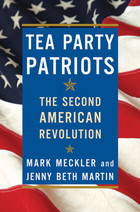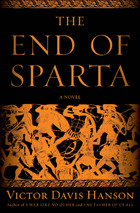 Tea Party Patriots starts as an early history of the grassroots political movement. It then evolves into a systematic call to arms (figuratively for now) for addressing what a good many people see as fundamentally wrong with our current American system. These issues run the gamut from executive overreach to cultural rejuvenation. As a manifesto, its strength is its ability to clearly lay out possible solutions to very complex problems while maintaining the realism needed to understand that this is a process and will not be accomplished overnight. Mark Meckler and Jenny Beth Martin both stay true to their grassroots in this work by stating that real change will come through influencing every level of government – restating the classic line that “all politics are local.” As our next political cyle looms, it will be interesting to see what impact these concepts will have on both state and national levels. Hopefully, change will occur and I am not taking of the type that President Obama endorses. If you are interested in taking back your country, this is one of the books to read.
Tea Party Patriots starts as an early history of the grassroots political movement. It then evolves into a systematic call to arms (figuratively for now) for addressing what a good many people see as fundamentally wrong with our current American system. These issues run the gamut from executive overreach to cultural rejuvenation. As a manifesto, its strength is its ability to clearly lay out possible solutions to very complex problems while maintaining the realism needed to understand that this is a process and will not be accomplished overnight. Mark Meckler and Jenny Beth Martin both stay true to their grassroots in this work by stating that real change will come through influencing every level of government – restating the classic line that “all politics are local.” As our next political cyle looms, it will be interesting to see what impact these concepts will have on both state and national levels. Hopefully, change will occur and I am not taking of the type that President Obama endorses. If you are interested in taking back your country, this is one of the books to read.
Monthly Archives: January 2012
The End of Sparta
 In the past, I have often felt that historians transitioning from academic writing to fiction have difficulty in maintaining the flow of plot over details so beloved in academia. Victor Davis Hanson, previously at the University of California – Fresno and currently Senior Fellow at Stanford’s Hoover Institute, has in my opinion suffered from this same difficulty in his inaugural novel, The End of Sparta. Displaying his wide expertise and depth in Greek historical minutia, it would seem that he has left the general layperson behind in a novel no doubt intended for a wide audience. Although my own knowledge of Greek history, literature and language have increased to maybe the level of a sophomore in Classical Studies due to reading this fictionalization of the Boeotian War, I believe that it would appeal mainly to those who have at least a superficial knowledge of such topics.
In the past, I have often felt that historians transitioning from academic writing to fiction have difficulty in maintaining the flow of plot over details so beloved in academia. Victor Davis Hanson, previously at the University of California – Fresno and currently Senior Fellow at Stanford’s Hoover Institute, has in my opinion suffered from this same difficulty in his inaugural novel, The End of Sparta. Displaying his wide expertise and depth in Greek historical minutia, it would seem that he has left the general layperson behind in a novel no doubt intended for a wide audience. Although my own knowledge of Greek history, literature and language have increased to maybe the level of a sophomore in Classical Studies due to reading this fictionalization of the Boeotian War, I believe that it would appeal mainly to those who have at least a superficial knowledge of such topics.
While reading it would would no doubt stir the interest of the ignorant (as I was) to further research this exciting period in the history of Western civilization, it suffers from a plot whereby at the end of the novel the fate of the main characters become, for me, seemly unimportant. The real strength of the story was at the beginning at the Battle of Leuctra. There, Hanson was able to display his capability as a wordsmith that had brought alive his previous works such as A Western Way of War: Infantry Battle in Ancient Greece and A War Like No Other: How the Athenians and Spartans Fought the Peloponnesian War. We can feel weight of the panoply, the mass at our backs, the dread of death or injury and the crunch of contact as two lines collide through his words. It is only in the story where he falters.
As other reviewers have noted, Hanson is not a writer laying down fiction so much as using fiction to flesh out history. He tries to lay open the mind of the Hellenes on paper, bring ancient motives out to be interpreted by modern readers. As a novel, it is marginal. As history, it is enlightening.
Happy New Year – 2012 edition
 So, after a long hiatus, I would like to state to all a Happy New Year. The month that I was out was supposed to be dedicated to finishing my thesis and other projects. However, I mainly just watched Korean TV dramas and ate a whole hell of a lot of food. I missed the opportunity to wish everyone a Merry Christmas, so I will do it now by saying that I hope everyone had a wonderful celebration of the birth of our Lord.
So, after a long hiatus, I would like to state to all a Happy New Year. The month that I was out was supposed to be dedicated to finishing my thesis and other projects. However, I mainly just watched Korean TV dramas and ate a whole hell of a lot of food. I missed the opportunity to wish everyone a Merry Christmas, so I will do it now by saying that I hope everyone had a wonderful celebration of the birth of our Lord.
Now back to New Year’s, where I would like to write out my resolutions for the New Year. First, I need to finish what I started – just for the sense of satisfactory completion if nothing else. Second, I want to lose weight. I have already drawn out and started a dietary regime. Next will be some sort of excercise. My roommate is going to the gym nowadays and I might get drawn into that. Finally, I want to move forward in my life, by which I mean that I want to get a real job that pays x amount of dollars for y amount of work allowing for z amount of satisfaction. I am now going to leave behind the algebra analogy because it just confuses me, math never having been my thing in school. But you get the point, right?
So, I will be waiting to hear on the State Department process in about 2 to 3 weeks. If I pass, I will do the Oral Interview. If not, I need backup plans. I really want that job, so if I have to restart the process later that is bearable. What to do in the meantime? I have been thinking about Korea so I may go teach there for a year. I like the food, the TV dramas, etc. The language looks a bit difficult, although that never really stopped me. It is something to think on.
